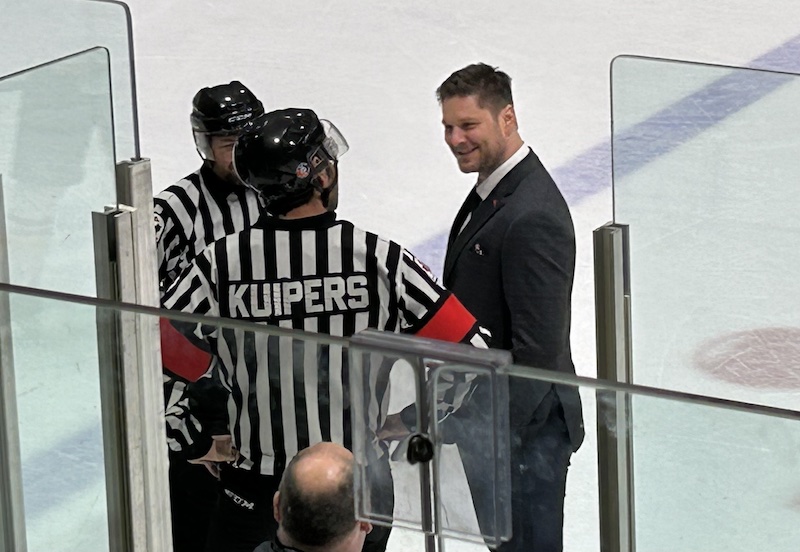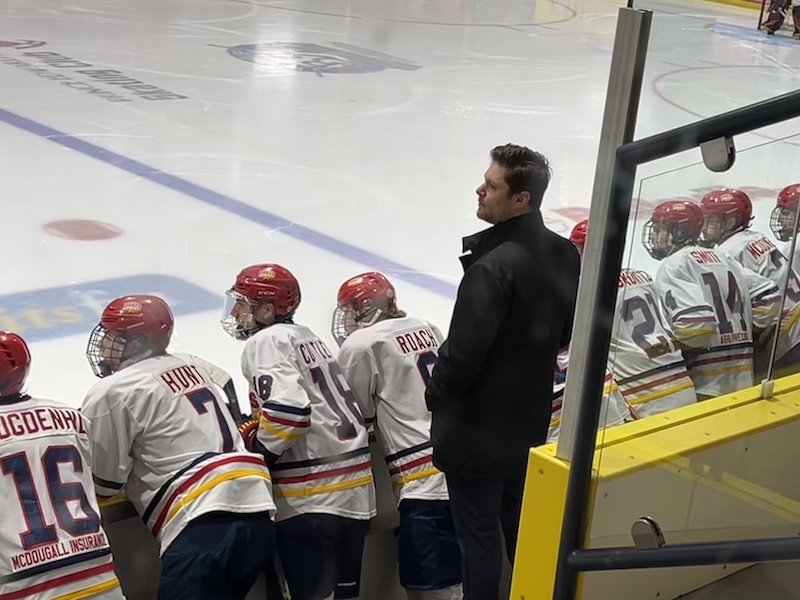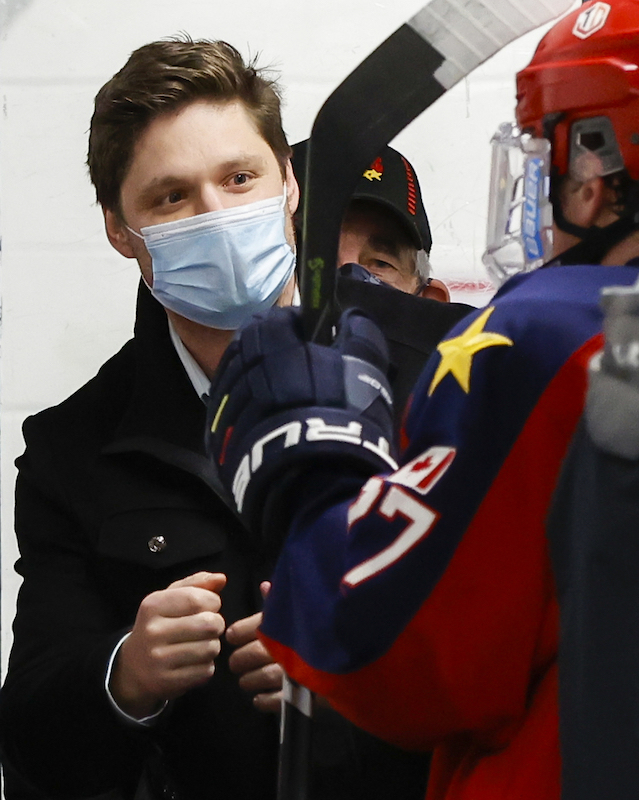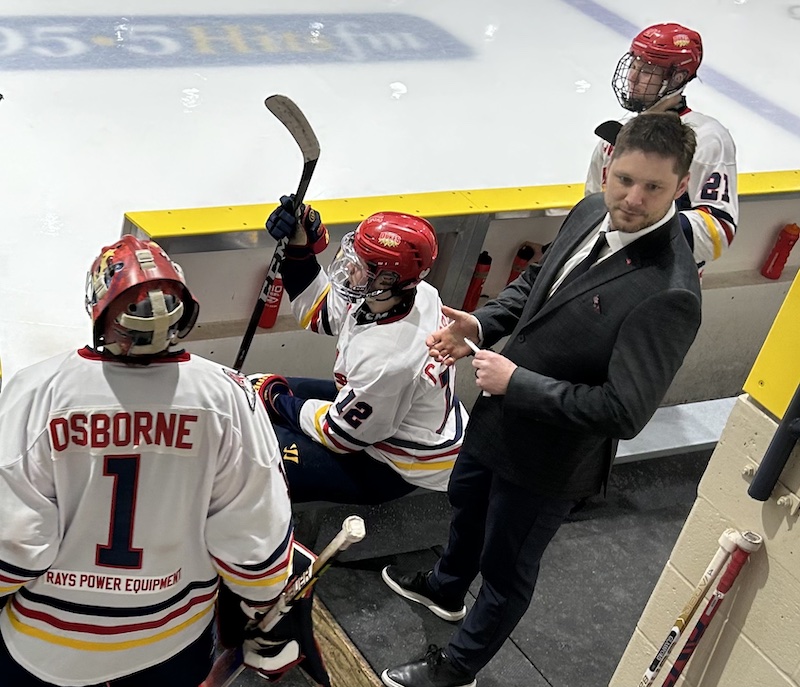
Derek Smith, head coach of the Wellington Dukes, after the Dukes won their first round in the Ontario Junior Hockey League 2022-23 playoffs against the St. Michael’s Buzzers in Wellington on Friday. Photo by Jessica Schmidt, QNet News
WELLINGTON – Passionate. Knowledgeable. Approachable. Compassionate.
These are some of the words used by the people who know him to describe Derek Smith, the head coach and general manager of the Wellington Dukes.
Smith got to where he is after years of hard work battling his way as a player through the Ontario Junior Hockey League, the National Collegiate Athletic Association, the American Hockey League and finally the NHL – all while struggling with persistent injuries.
So how did Derek Smith come full circle?
Born and raised in Belleville, Smith played hockey with the Quinte Red Devils, a triple-A competitive team. In 2000, at age 16, he was called up to the Wellington Dukes of the OJHL. He stayed for 12 games that season, and spent the following three full seasons with the Dukes. In 111 games he scored 19 goals and 51 assists – a decent record for a defenceman in the league.
In a wide-ranging conversation with QNet News, Smith fondly recalled playing in the team’s former arena, the old Duke Dome, and the crazy atmosphere during the playoffs, when fans would show up four hours early to save their seats. He cited the heartbreak of losing in the league playoffs and in the semifinals of the national championship, the Royal Bank Cup, but also the joy of winning the Central Ontario Region championship, the Dudley Hewitt Cup.
At age 18, while still with the Dukes, Smith was invited to try out for the Cape Breton Eagles of the Quebec Major Junior Hockey League. He was with the team for camp but wasn’t able to get a billet family at the team’s base in Sydney, N.S. He ended up coming home – something that turned out to be a recurring theme in his career.
The team had some great players, he said, citing Vezina Trophy-award-winning goaltender Marc-André Fleury of the Minnesota Wild, but it just didn’t work out for him to be away from home yet.
Smith played two more years with the Dukes, but at 20 had hit the OJHL age limit. He didn’t know what to do next because he hadn’t been planning for his future after the Dukes, he said.
“I remember sitting at my dining room table at my parents’ house (with) a bunch of paperwork and I was just like, ‘I don’t know.’ “
He ended up taking business management and marketing at Lake Superior State University in Michigan – a school that had offered him a place on its hockey team.
It was in the Division 1 League, which for some players is a stepping stone to the NHL. There were more workouts and more practices than he’d experienced with the Dukes. The hard work, though, would soon pay off.

Derek Smith behind the bench in Wellington for Game 3 of the 2022-23 playoffs against the St. Michael’s Buzzers. Photo by Jessica Schmidt, QNet News
“You could just tell by the way that he carried himself he didn’t need that background of playing professional hockey to be respected by the players. The players knew that Smitty was a smart coach, and the players wanted to play for him. They wanted to play his style. It obviously helped he played pro hockey, but for him, it definitely was not needed in order to gain the players’ respect.”
– Johnathan Balah, defenceman with the Wellington Dukes in 2021-22
Balah says he could go to Smith for help with anything, which he feels helped him get where he is now: the Holy Cross Crusaders, a Division 1 team in Massachusetts.
“He let the players play,” Balah told QNet. “He encouraged creativity a lot. … Smitty’s freedom towards his players and allowing them to create their own plays, create their own opportunities, was instrumental in not just me, but for other guys to get to where they are.”
During Smith’s third year at Lake Superior, in 2007, the team lost in the semi-finals of the league playoffs, but he started getting calls from NHL teams.
He got an agent and together they looked over the offers he’d got to play in the AHL, the farm league for the NHL. He hesitant to accept any of them because he wanted to finish his schooling, he said. But in the end he signed on with the Binghamton (N.Y.) Senators of the AHL, at the time the farm team for the NHL’s Ottawa Senators. (In 2016, the team was moved to Belleville to become the Belleville Senators.) That was the end of university for him, but the start of his professional hockey career.
In retrospect, Smith says, maybe he wasn’t quite ready for the jump.
“I was 22 years old (and) probably wasn’t mature enough to play pro hockey with a bunch of 30-, 32-year-olds” for whom the game was a job. He’d gone from a college atmosphere with teammates all in their early 20s and a school-pride culture to a team “with a bunch of older guys with three, four kids.”
Smith’s first game with Binghamton was a weird one.
It was in early October and warm weather had come through that left the inside of the arena shrouded in fog. Play had to be stopped at every whistle and both teams would get off the bench and skate around to help the fog lift. He says the experience helped him over his nerves about being in the AHL.
The Binghamton experience was “old-school hockey” with a lot of fighting, Smith says. As a young defenceman, his job was to finish checks and fight. He learned a lot from his roommate and teammate, Jeremy Yablonski. Smith calls him the toughest guy he’s ever seen in his life. It was Yablonski and a couple of the other tougher players who watched out for Smith and stood up for him when it was needed on ice.
Yablonski and his wife also taught Smith and some of the other rookies – all fresh out of college– how to cook and how to be adults, he said.
After three years with Binghamton, Smith had yet to move up to the NHL. But one day in February 2010, his coach called him after practice and told him to get on a flight, because he was going up to the Ottawa Senators.
As he sat on the bench before the first game, one of the veteran players came and congratulated him on getting called up. It was a special moment to have someone who’d been playing in the NHL for 10 years congratulating a young kid playing his first game, he says.
Playing with stars like Henrik Zetterberg, Tomas Holmström, Daniel Alfredsson and Jason Spezza, who were all about to go off and compete in the 2010 Olympics, he says.
But in the end he played just two games in the NHL that year before being sent back down to finish the season with Binghamton.

Smith made sure to check on his players when the COVID pandemic shut down hockey, former player Mason Reeves says. Photo courtesy of Amy Deroche, OJHL Images
“He was probably the only coach I’ve ever had that had a true open-door policy. Obviously coaches say (the) door’s always open, but he was always there for anything anybody ever needed. (It) doesn’t matter if you were a first-year guy on the team, a fourth- or fifth-year … he would do anything. He would literally give you the shirt off of his back to make sure that you succeeded. I can’t thank him enough for everything he did for me, especially during that COVID year when things were really tough mentally and when everyone didn’t really know what was going on with the world. He was always checking in. He was always making sure everybody was staying on top of their training and doing everything that they could possibly do to get better. Best coach I’ve ever had by far.”
– Mason Reeves, forward with the Wellington Dukes from 2020 to 2022
Reeves started with the Dukes in the 2020-21 season that got shut down due to the COVID pandemic. He now plays for the Varsity Blues at the University of Toronto.
Smith spent a couple of years moving up and down between the AHL and NHL with Binghamton and Ottawa. It was after Binghamton won the AHL’s championship, the Calder Cup, in 2011 that he got offers from other NHL teams.
“I remember sitting there at my house in the summer talking with my parents, and I always wanted to be a Leaf. I was a big Leafs fan and I had an offer from them. There was an offer to go back to Ottawa. And then another one was Pittsburgh. And I remember contemplating Pittsburgh and Calgary.” He eventually chose the Calgary Flames.
That decision was “not based on financial security, which was probably stupid at the time,” he says, explaining that as a 25-year-old it probably would have been better to go to a team offering him better money. But the Flames were offering him guaranteed ice time, and he badly wanted to play in the NHL. Smith was with Calgary until 2014.
He remembers scoring his first goal like it was yesterday, he says.
Random Flames Goal Of The Day
November 29th, 2011. Forever a Flame, Derek Smith, scores his 1st NHL Goal on a nice slap pass from TJ Brodie.
Smith played in 83 games for the Flames spanning over 3 seasons. pic.twitter.com/NYm5HlZsrg
— Robert Munnich (@RingOfFireCGY) May 9, 2022
But what sticks out the most, he says, is when, two months into his first season, general manager Jay Feaster came down to talk to him after a practice. He thought he was going to be told he was going back down to the AHL, he says. Instead, he was handed a letter stating he would be with the team full-time and to go get a house set up.
The Flames missed out on the playoffs for those three years, but Smith says he’s grateful for having had some great teammates. Two current Toronto Maple Leafs defencemen, Mark Giordano and T.J. Brodie, are players from his time in Calgary whom he’s still close with.
During those three years, Smith struggled with injuries that had him missing a lot of games. He had knee and ankle injuries and ended up with several concussions. Looking back on it, Smith says, he should have missed more paying time – but hockey was his job, and he felt a lot of pressure to play. (The NHL has since tightened up on its concussion protocols.)
Playing through concussions ended up catching up to him, he says. He didn’t have a good life outside the rink, struggling with the symptoms of his concussions, and his performance on the ice was suffering. At the end of the 2013-14 season he was sent down to the AHL to play for the Abbotsford (B.C.) Heat, but had to miss the playoffs due to post-concussion syndrome.
He took that time off to deal with his health, and when that year’s NHL Free Agency opened up, he got offers to a couple of teams to return.
“But because of my injury problems and the way that I ended my season in Calgary, they were two-way contracts, which means NHL and AHL,” Smith explains. “So it was another situation like it was in Calgary, where it’s ‘Come to camp and prove you’re better than somebody’ to be on the team. And with my health, I just wasn’t ready for that. I decided that with my mental state, I wasn’t ready to battle. I didn’t want to go through the up and down and go on planes and sit on buses. And I thought that it was probably best for me to choose another avenue.”
And so he ended up playing for the ZSC Lions, a Zurich-based team in Switzerland’s National League. Some former teammates from Binghamton were also on the Lions, so he wasn’t alone. While it was tough being so far from home, Smith says, it was a beautiful place to live.
Unfortunately, it didn’t last.
It was Dec. 5, 2014, and they were playing a team in the French part of Switzerland. Smith went to hit a player and struck the boards so hard that he broke his back. He was out for the rest of the season.
“I was trying to figure out what was next. And instead of really taking some time off and trying to get my head and my body right, I thought about, ‘Well, this is my life and my career. And I’ve got to try to go as long as I can.’ ”
So he returned to the U.S. and signed on with the Springfield (Mass.) Falcons in the AHL. But once again, it didn’t last long.
Exactly a year after breaking his back in Switzerland, Smith took a skate to the face which left him with another concussion, and he only played four more games the rest of that season before finally deciding to take some time off.
He went to Pittsburgh and Boston to receive concussion therapy and was out of hockey until June 2016. His plan had been to stay home for a few more months to work on getting healthy, but he got a call from an agent offering him a spot on a Croatian team in the Kontinental Hockey League, and he took it. It gave him the chance to visit many Eastern Europe countries, notably Slovakia, Belarus and Russia, which he called an amazing experience. He finished the season out, but was still suffering physically from all those years of injuries. He decided to stop. He was 33.
“I had to retire and I spent some time getting healthy,” he says. “I probably retired four or five years before I thought I should. I was planning to play until I was 40. (But) that set me up for the next part of my life, which was coaching. And it wasn’t something I wanted to do, but the situation came about and now it’s the best decision I (could have) made, because I enjoy it. I enjoy giving back to kids and helping them hopefully get the opportunity that I had. And hopefully they can learn from my mistakes.”

After playing in the NHL for five years and struggling with post-concussion syndrome, Smith focuses on player safety as the head coach of the Wellington Dukes. Photo by Jessica Schmidt, QNet News
“I think the thing that stands out the most is (that) Smitty’s coaching style is a lot more new-school. He’s definitely the complete opposite of the old-school coaches, where it’s like kind of fear tactics. He’s much more welcoming, embracing, and easy to talk to. … He’s very respectful and cognizant of player health, both mentally and physically. He’s never pushing me or players to play through injury if it’s unsafe or if he feels that they shouldn’t be pushing it. Often you’ll hear him say … ‘If you’re not 100-per-cent, you can’t play.’ He’s very much aware of what can happen when you push through injuries. And he’s never pushing guys to return early, which is really refreshing.”
– Leah Toffelmire, the Wellington Dukes’ athletic therapist
Toffelmire has been with the team for seven years. She said that Smith’s time playing professional hockey has shaped him as a coach.
“We don’t talk a ton about his injury history or anything like that. I’m pretty aware of what … he’s been through. But he has said that … he’s witnessed professional players destroying themselves for the sport. And I think he really wants to make sure that these players don’t – that they have lives after the fact.”
After finishing his season in the KHL, Smith spent eight months in concussion rehab. He had originally wanted to get a job with the Belleville Senators, but it didn’t work out.
Just before Christmas 2017, he got a call from one of the owners of the Wellington Dukes, asking if he’d like to help out. Smith agreed and within a week was behind the bench working with the defence.
He’d never thought about being a coach and didn’t have any sort of training, he says. But it only took a month for him to realize how much he loved it – and in the 2017-18 season the Dukes won the Buckland Cup in the OJHL and went on to play in the Royal Bank Finals, coming in second.
Smith became the head coach of the Dukes for the 2019-20 season. On Feb. 10 of this year, he got his 100th regular-season career win as a coach for the Dukes.
“Everybody’s got a goal, whether it’s playing in the NHL, playing the next level,” Smith says. “But they lose track of how to be a good human being. And we need to make sure … as a staff, to just let them make choices – and hopefully the right ones. And if they’re not, then teach them about it so they can grow as people and, be successful human beings.”
His own previous coaches have all played a part in how he coaches, he says. He takes little bits of what others have done and uses his own experience to create his coaching style. But his biggest concern, he says is making sure the players are supported, and that when they leave the team, they leave as a better person.
Staying on as the head coach for the Dukes is right where he wants to be at this point in his life, Smith says. He and his wife, Kailey, and their children Kinsley, 2, and Boden, 1, are comfortably settled in Belleville, so he’s in no rush to move anywhere else. There will be options to move up to higher levels of hockey, he says, but as he coaches the team he started his junior career with 23 years ago, he loves the Dukes, the community and the fan base.
Derek Smith has come full circle.
 Print This Post
Print This Post






